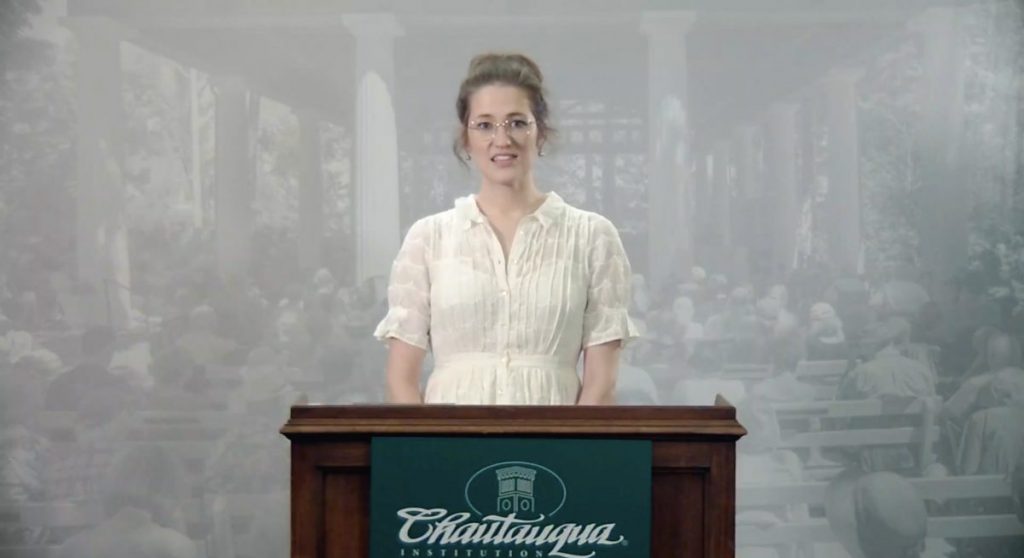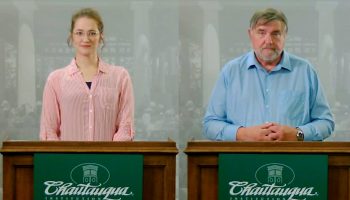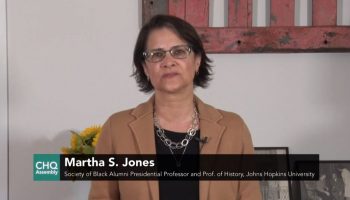
Emálee Krulish has always been interested in studying the little guy — or the little gal.
As the archives assistant at the Chautauqua Institution Oliver Archives Center, Krulish has worked to shed a light on how regular folks helped shape history, not just the leaders, celebrities, and elected officials that fill history textbooks.
Since the centennial of women’s suffrage in New York in 2017, this meant studying how the women of Chautauqua County maintained the suffrage movement after major figures like Carrie Chapman Catt and Susan B. Anthony planted this philosophical seed during their visits.
Krulish poured this research into the Chautauqua Magazine article “Chautauqua: ‘The Loving Friend’ to the Women’s Rights Movement.” And at 3:30 p.m. EDT Friday, July 31, on the CHQ Assembly Video Platform, Krulish will present on this research further in a Heritage Lecture Series presentation titled “Women Who Do Things.”
One of the goals in this research was to “name drop” as many local women as possible, and to give credit where it was due. Krulish noted that it wasn’t entirely the Institution leadership, or the nationally recognized suffragists, that kept the movement afloat in the region.
“I’m hoping what everyone takes away from this is that … the women’s political equality movement was bigger than its leaders. It was the little people who made it happen,” Krulish said.
In her article, Krulish addresses the many female-driven organizations founded in the era, like the Suffrage Club, Suffrage Association, Equal Rights Association, and the Chautauqua Women’s Club — which still operates in 2020. This passion from locals inspired the Institution’s first Women’s Day in 1891, which welcomed nationally recognized suffragists and discussions about women’s rights. Institution officials saw success and dubbed this celebration the “best and biggest day” in its 17-year history.
Krulish will also do some “myth-busting” in her lecture in regards to many widely held misconceptions about women and the Institution. In particular, Krulish wants to dispel the myth that temperance advocate Frances Willard was the first woman to speak at the Institution, and that no women were permitted on the platform beforehand.
“The big thing is myth-busting. That’s how I open up (the presentation) — there’s all sorts of myths about Chautauqua,” Krulish said. “I’ve heard and I’ve read in publications that Chautauqua did not allow women on the platform, and especially did not allow women’s politics on the platform — which is not true. The takeaway is that women were always on the platform.”
The misconception that women were barred from the platform before Willard may have come from the knowledge that Institution co-founder John Heyl Vincent opposed women’s suffrage; however, that is just Krulish’s theory. In her research, Krulish found several women who spoke in the years leading up to Willard’s presentation.
While it is hard to track down the origin of this story, Krulish said she understands why it was easily spread.
“That’s the reason myths are proliferated over the years, because people (think) there is no reason not to believe it. It seems practical, it seems like it could’ve happened,” Krulish said. “Especially (the story of) Frances Willard — that sounds great that she was the first woman. But if you look at (just) that weekend, she shared the platform with a number of other women.”
Another major misconception is that suffragist Elizabeth Cady Stanton visited the Institution to speak on suffrage. While it is likely that Stanton visited the county, Krulish found no documentation that she had ever held the stage. Krulish credits misinformation like this to the discrepancies between planning and execution.
Krulish pointed to one tidbit she came across in her research, while reviewing Vincent’s journals. Every entry included his personal account and a newspaper clipping from the day. One clipping was the announcement of a reception welcoming several nationally recognized suffragettes, but Vincent had crossed out the name of one.
With no context in existing articles or the diary, Krulish had to ask herself — did this suffragist attend? What happened between the announcement and the banquet that did not get reported on or recorded elsewhere?
“It’s important for us as readers and learners to think for ourselves and not just accept what’s handed to us,” Krulish said. “So, (we should) always have a questioning mind and look into the most enticing bits of information. We (should) question it for ourselves (and) look into it further — no matter who it is.”
Krulish said she hopes to inspire the audience to dig deeper when studying a topic, and to take into account all sources — from first-hand accounts to newspaper reports.
“I find historical inaccuracy to be frustrating. I find myself watching documentaries and I’m like, ‘That’s wrong,’” Krulish said. “It’s very frustrating to be somebody who cares, … because now this information is being widespread to people and they digest it, and that’s how history gets written.”
This series is made possible with a gift from Jeff Lutz and Cathy Nowosielski.




